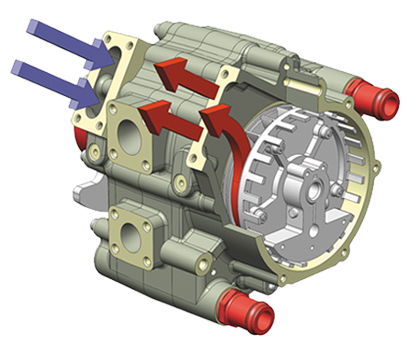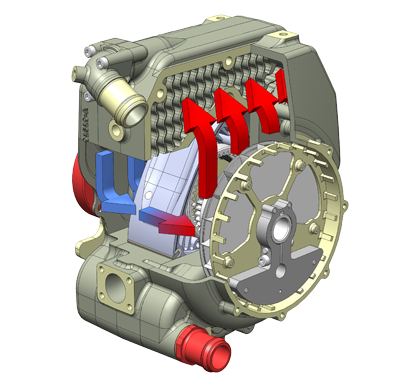Wankel Rotary Engines – Aren’t they unreliable and use excessive oil?
Since the introduction of the Wankel engine in the NSU in 1967, a level of concern around the engine’s reliability and oil consumption has been expressed, historically there have certainly been some issues with wear on some of the sliding seal components and in particular, the apex or “tip” seals on the engine’s rotors.

Sparcs
AIE patented SPARCS (Self-Pressurising-Air Rotor Cooling System) is rewriting the rules in rotary engine design with the advanced ability to utilise pressurised gases from the combustion process as a medium for cooling. By means of an external heat exchanger to deliver superior heat rejection and a completely sealed engine core, SPARCS provides AIE Wankel rotary engines with longer endurance and zero oil loss for increased performance.
These concerns have been addressed in modern rotary engines (such as AIE’s) through the application of low friction, hard wearing coatings on the running surfaces of the engine (rotor housing and end plates) and also the use of ceramics for the actual apex seals themselves. The combination of these material advances has all but eliminated seal wear and furthermore reduced engine friction considerably. Thus the impact on the overall life of the engine and its efficiency has greatly improved.
This improved seal performance combined with the AIE’s revolutionary “SPARCS” rotor cooling system reduces the amount of oil required for lubrication and thus the amount consumed. In a SPARCS-enabled engine, core component temperatures are considerably lower than in similar non-SPARCS engines, therefore, allowing the oil to function more effectively on the sidling and rolling contact surfaces without being broken down by the excessive heat typically seen in the rotor of the engine.

Compact Sparcs
A marvel in lightweight engine development, AIE patented Liquid-Cooled Compact SPARCS (Self-Pressurising-Air Rotor Cooling System) delivers exceptional thermal balancing with surprisingly small form factor and fewer components. Utilising pressurised oil-gas mixtures for heat absorption, Compact SPARCS internal heat exchanger efficiently rejects heat from the engine core to its main liquid cooling system resulting in a longer, and lighter engine life.
One fact to consider is that reciprocating piston engines “do” use oil. Most people do not realise this and while it is certainly true that modern piston engines use very little oil (thanks to years of dedicated development), some piston engines released in recent years do still use a surprising amount, particularly some of the newer diesel engines. This issue has even led to some media coverage about people believing their engines are “faulty” and trying to return them to dealers as they are just not used to having to top up their oil.
While a rotary engine may not match the “best” piston engines in oil consumption, they can certainly compete with higher tuned “sports” engines. Imagine taking your 1300cc four-cylinder piston engine and tuning it to deliver 280hp; it is highly likely it will consume substantially more oil than it used to? 280HP is just what the 1300cc Mazda RX8 engine delivers as standard with only two rotors (650cc each) and so as with many things in life when you look into the detail, apples are not always compared with apples.
For further information on AIE and its range of engines and technologies, please visit AIE’s product page.
This article is part of a question and answer series which can be found at: Ten inaccurate preconceptions about Wankel rotary engines discussed.



